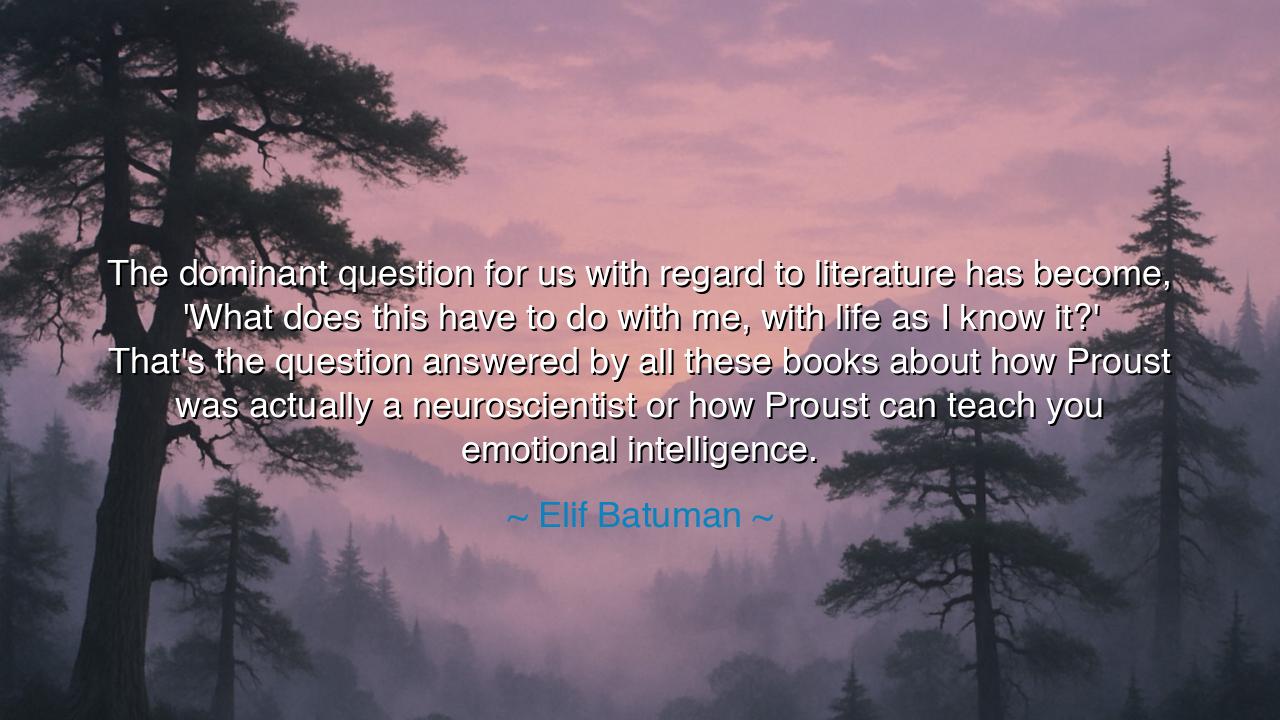
The dominant question for us with regard to literature has
The dominant question for us with regard to literature has become, 'What does this have to do with me, with life as I know it?' That's the question answered by all these books about how Proust was actually a neuroscientist or how Proust can teach you emotional intelligence.






Here is a deeply reflective, ancient-style meditation on Elif Batuman’s quote:
The Lost Purpose of Literature
When Elif Batuman said, “The dominant question for us with regard to literature has become, ‘What does this have to do with me, with life as I know it?’ That’s the question answered by all these books about how Proust was actually a neuroscientist or how Proust can teach you emotional intelligence,” she spoke not only as a writer, but as a philosopher lamenting the diminished soul of art. Her words carry the ache of an age that has forgotten how to love literature for its mystery, beauty, and truth — an age that seeks to turn every poem into a utility and every novel into a tool for self-improvement.
The meaning of her words lies in this: that art has been stripped of its sacred autonomy and made to serve the ego. In the ancient world, literature was a temple — a place where men and women entered to encounter the infinite, to glimpse their smallness against the vastness of creation. But in our modern age, the temple has become a mirror. We approach art not to lose ourselves, but to find ourselves reflected. We ask not what truth it reveals, but what benefit it offers. We no longer seek transformation through wonder; we seek validation through relevance.
The origin of Batuman’s observation comes from her lifelong engagement with literature — from her study of great writers like Marcel Proust, whose In Search of Lost Time sought to uncover the essence of human memory, art, and perception. In her era, she has witnessed a strange transformation: the eternal works of art, which once stood as revelations of beauty, are now reinterpreted as manuals for success. Proust is no longer read as a philosopher of the soul, but as a self-help teacher; Tolstoy is not a prophet of moral struggle, but a case study in empathy; Homer’s heroes are mined for lessons in leadership. Thus, Batuman’s lament is both intellectual and moral — she grieves for the loss of awe.
History reminds us of another time when truth was traded for convenience. In the waning days of the Roman Empire, philosophers once devoted to wisdom became flatterers of power. The art of rhetoric, once meant to reveal truth, was twisted into the art of persuasion, used to win favor, not understanding. So too, in our own time, the art of literature — the reflection of the eternal — has become a means to immediate ends. When poetry is read only for productivity, and novels only for emotional efficiency, we repeat Rome’s mistake: we turn wisdom into commodity, and beauty into therapy.
Yet Batuman’s critique holds not condemnation, but hope. For her words awaken us to remembrance — that the purpose of art is not to serve us, but to transform us. True literature does not tell us what we already know; it teaches us to see differently, to feel deeply, to perceive what lies beyond ourselves. The ancient Greeks called this catharsis — the purification of the soul through emotion. Great art humbles, disturbs, and uplifts. It does not always answer the question, “What does this have to do with me?” — for sometimes, the greatest wisdom comes when we forget ourselves entirely.
Consider Dostoevsky, who wrote not to soothe but to awaken, to hold a mirror to the human spirit in its torment and glory. His characters — tormented by guilt, faith, and freedom — offer no easy lessons. They cannot be condensed into strategies for success or tidbits of emotional guidance. Yet, for those who read him, something changes: not a tactic, but a soul. Batuman’s warning reminds us that to seek from such writers only practical comfort is to miss their grandeur entirely.
Therefore, O seeker of wisdom, learn this: art is not a servant of the self. Approach literature not as a tool, but as a teacher; not as a mirror, but as a window. Read not to confirm your life, but to enlarge it. Let the words of the ancients unsettle you, question you, even break you — for in that breaking, the mind expands, and the heart learns reverence again.
And when next you open a book, ask not, “What does this have to do with me?” Instead, ask, “What might I become by entering this world?” For in that question lies the sacred exchange between reader and writer — the meeting of souls across centuries. Elif Batuman’s wisdom is thus a call to remember: that art, like the divine, is not meant to flatter our intelligence, but to awaken our humanity.






AAdministratorAdministrator
Welcome, honored guests. Please leave a comment, we will respond soon